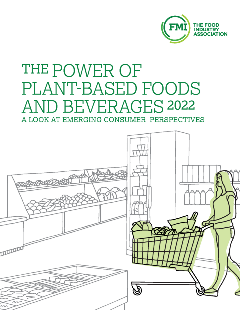Analysis Reveals Consumer Perceptions of the Plant-based Marketplace
Arlington, VA—FMI—The Food Industry Association, today releases the inaugural Power of Plant-based Foods and Beverages 2022 report which is the first-ever comprehensive review of the plant-based topic broadly, addressing naturally plant-based foods such as fruits, vegetables, beans and whole grains and alternatives to traditional animal-derived items. Our analysis finds nearly half (42%) of shoppers put either a lot or some effort into selecting plant-based foods or beverages.
Power of Plant-based Foods and Beverages 2022 report which is the first-ever comprehensive review of the plant-based topic broadly, addressing naturally plant-based foods such as fruits, vegetables, beans and whole grains and alternatives to traditional animal-derived items. Our analysis finds nearly half (42%) of shoppers put either a lot or some effort into selecting plant-based foods or beverages.
“More than 40% of shoppers at least occasionally eat a meat, dairy or seafood alternative, but dairy alternative sales are more than twice those of meat alternatives,” shared Steve Markenson, director of research and insights for FMI. “The plant-based foods most likely to be regularly consumed by shoppers are naturally plant-based — fruits and vegetables (75%) and beans, nuts, or grains (47%).”
Opportunities for Shopper Education & Retail Merchandising
Shopper feedback indicates confusion about plant-based foods and beverages and a lack of knowledge about key attributes of these options. The majority of shoppers surveyed responded that the word “healthy” came to mind when thinking of plant-based foods and beverages. Others associated plant-based foods with words such as “vegan,” “vegetarian,” "organic” or “natural.”
“Our ethnographic research suggests consumers are seeking out plant-based foods and beverages primarily for both taste and nutrition,” shared Krystal Register, MS, RDN, LDN, senior director for health and well-being at FMI. “The food industry has an opportunity to provide guidance and educate consumers on overall healthy eating approaches that include plant-based options in alignment with the Dietary Guidelines.”
FMI Vice President, Fresh Foods, Rick Stein, underscored how retailers might work with their shoppers to better define where these categories appear in the store. “There’s no consensus among shoppers about where to find plant-based alternatives, which demonstrates the opportunity for both cross-merchandising in addition to creative in-store messaging,” Stein said. “For example, for meat alternatives, the top choice is not the meat department – it’s a designated plant-based foods section and the frozen foods section, followed by the meat department.”
Generational and Demographic Differences Suggest Growing Curiosity
The research found that curiosity is a major characteristic for shopper experimentation. Millennials are more likely than Gen X and Boomers to put effort into selecting plant-based foods, and nearly half of shoppers buying plant-based foods and beverages live in households making over $100,000 and have children. Shoppers interested in these foods and beverages tend to have bigger basket sizes, but also shop online.
Comprehensive Approach to Shopper Insights
NielsenIQ generously sponsored the Power of Plant-based Foods and Beverages and provided sales data and analysis for the report. A comprehensive methodology was undertaken for the report, including a consumer survey, digital consumer ethnography, consumer interviews, retail and manufacturer interviews and sales-data review.
“As the lens of plant-based expands beyond meat and dairy alternatives and we see ‘plant-based’ marketing claims on food and beverage products, the segment is now worth nearly $10 billion,” says Sherry Frey, vice president, total wellness, NielsenIQ. “This research comes at a critical inflection point that will help the industry understand consumers and their drivers around plant-based decisions.”
The FMI Power of Plant-based Foods and Beverages is a new addition to the association’s portfolio of existing consumer analyses regarding produce, meat, bakery, health and well-being, foodservice and private brands. Access the report at www.FMI.org/PowerofPlant-Based.
For Media:
- Contact media@fmi.org for a gratis copy of the Power of Plant-based Foods and Beverages 2022 report. Gratis copies of our research are reserves for members of the media only.
- Please utilize the Power of Plant-based Foods and Beverages 2022 infographic video as a multimedia component of your coverage.
 Industry Topics address your specific area of expertise with resources, reports, events and more.
Industry Topics address your specific area of expertise with resources, reports, events and more.
 Our Research covers consumer behavior and retail operation benchmarks so you can make informed business decisions.
Our Research covers consumer behavior and retail operation benchmarks so you can make informed business decisions.
 Events and Education including online and in-person help you advance your food retail career.
Events and Education including online and in-person help you advance your food retail career.
 Food Safety training, resources and guidance that help you create a company food safety culture.
Food Safety training, resources and guidance that help you create a company food safety culture.
 Government Affairs work — federal and state — on the latest food industry policy, regulatory and legislative issues.
Government Affairs work — federal and state — on the latest food industry policy, regulatory and legislative issues.
 Get Involved. From industry awards to newsletters and committees, these resources help you take advantage of your membership.
Get Involved. From industry awards to newsletters and committees, these resources help you take advantage of your membership.
 Best practices, guidance documents, infographics, signage and more for the food industry on the COVID-19 pandemic.
Best practices, guidance documents, infographics, signage and more for the food industry on the COVID-19 pandemic.
